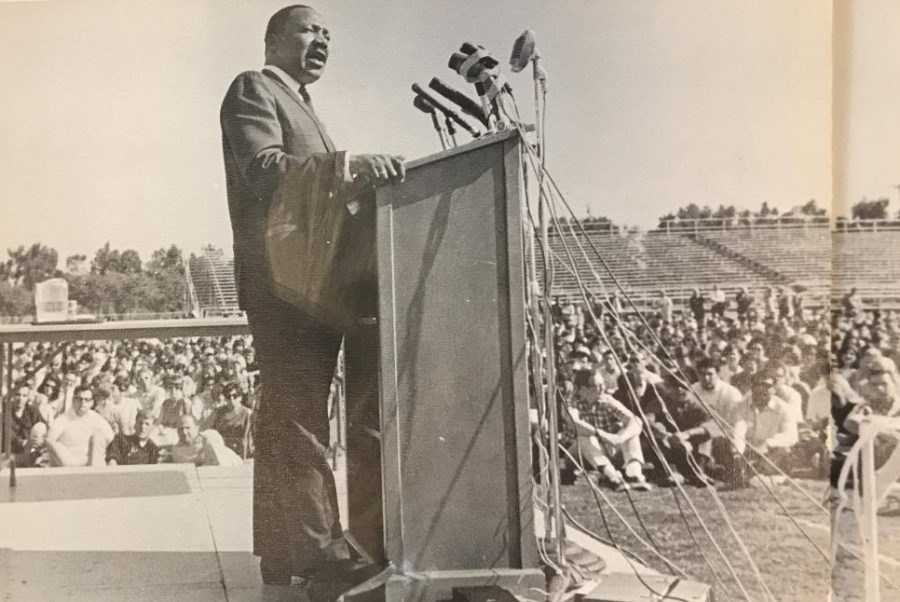Student athletes remember MLK, speak on peaceful protests in NFL
File Photo – The State Hornet
Civil rights leader Martin Luther King Jr. delivered a speech about racial inequality in front of approximately 7,000 students at Sacramento State College, now named Sacramento State, on Oct. 16, 1967.
October 11, 2017
(Go to StateHornet.com/MLK50CSUS for more related stories)
Nearly 50 years ago, civil rights leader Martin Luther King Jr. didn’t just speak at Sacramento State — he urged approximately 7,000 students to overcome racism at the football field where Hornet Stadium stands today.
“I don’t have to point out too many things here, we need only open our newspapers and turn on our television,” King said at Sac State on Oct. 16, 1967. “Day in and day out we are reminded that the problem (of racial inequality) is far from resolved.”
After speaking to six Sac State student athletes, The State Hornet learned that only one knew that King spoke on campus. However, all six remain aware of his importance in American history.
“Martin Luther King was one of the greatest leaders this country has ever seen without a doubt in my mind,” said Dre Terrell, the Hornets junior cornerback. “He basically paved the way of Black-American history, just a tremendous leader that is still impactful today. Everything that he was preaching about, I can see how it is affecting us today still, sad to say.”
(Story continues below timeline)
King made numerous mentions to racial inequality during his speech on campus, a topic that is still frequently spoken about today.
“MLK was definitely a figure in history that’s definitely revered, especially in the African-American community, but I just think in American history as a whole,” said Joseph Ajeigbe, the Hornets graduate transfer running back. “Especially now with the division that is going on in our country.
“I think if we just go back to that and try to unify the nation — and stop looking at people for the color of their skin but the content of their character — I think we’ll be able to kind of heal some of these divisions that are going on in the nation.”
These divisions have carried over to the world of sports as hundreds of NFL players have chosen to kneel during the national anthem to protest police brutality and injustices that people of color deal with in America today. These demonstrations were initially sparked by former San Francisco 49ers quarterback Colin Kaepernick and have reached a point where Vice President Mike Pence left a football game between the 49ers and Indianapolis Colts because of the protests on Sunday.
I left today’s Colts game because @POTUS and I will not dignify any event that disrespects our soldiers, our Flag, or our National Anthem.
— Vice President Pence (@VP) October 8, 2017
“They’re just doing their part, man,” said Isiah Hennie, the Hornets senior receiver. “When (you have) a platform, you use it, and I like what they’re doing, especially that the owners jumped on board. They don’t like being told what to do (and) I think what everyone’s doing is they’re doing their part to make sure people get equal rights — actual, equal rights around the country.”
Sac State senior setter Kennedy Kurtz said she believes a different outlet could be better utilized by athletes. The demonstrations from some players has perhaps turned from battling against racial inequality to arguing against President Donald Trump due to his harsh remarks to athletes in the NFL, she said.
“You know, as an athlete myself, I’ve had a lot of my grandparents and a lot of my uncles and aunts and cousins in the military, so me personally, I will always stand for the anthem,” Kurtz said. “I think that what Colin Kaepernick started was a good idea in a sense that was a great platform in which he used.
“But I think that now the media has taken over it, and I think it’s turned from, ‘OK, let’s protest for police brutality,’ and ‘Let’s protest against this’ to, ‘OK, now we’re making a political statement in the sense of it’s turning to (President) Trump and directed to Trump and directed towards his comments,’ and I feel like the whole entire protest itself is not taking the right direction because the media (have) kind of twisted it.”
Her teammate, junior middle blocker Brie Gathright, said she’s on the fence about the matter. However, she understands and respects both points of view and said she will still proudly put her hand on her heart during the anthem.
RELATED: MLK at Sac State: 50 years later
“I don’t have a problem with the pro athletes taking a kneel because it’s not that they’re trying to be unpatriotic, I just believe they’re standing for something that is a problem for the U.S.,” Gathright said. “I just think it’s a big issue, and I just hope, as time flows, we’ll be able to overcome it.”
In an effort to honor King’s 50th anniversary and to keep awareness of the issues he preached against on campus, Sac State will host a “March for Empathy” starting from the University Union to Hornet Stadium at 1 p.m. on Oct. 16, and people have taken notice.
“MLK is one of the most historical civil rights leaders of all time, and, so that being said, me being an African-American male, that’s important, and if we have a rally or do anything, I’m going to be at the forefront because that’s a big deal,” Hennie said. “Especially what’s going on right now, it seems like a lot of stuff is trying to be divisive, but our locker room has stayed together, and I’m going to do my part and have my political views, and I just think that’s a big deal.”
Additional reporting by Will Moon, Shaun Holkko and Carlo Marzan
RELATED: Campus to celebrate 50th anniversary of MLK’s visit





























































































































